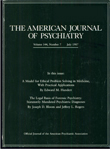Exclusion of expansion of 50 CAG/CTG trinucleotide repeats in bipolar disorder
Abstract
OBJECTIVE: The purpose of this study was to identify the specific expanded CAG/CTG trinucleotide repeat associated with bipolar disorder. METHOD: The study employed an efficient multistage approach for using a genomic CAG/CTG screening set. RESULTS: The authors found no evidence of expanded repeats at 43 polymorphic autosomal loci and seven X chromosomal loci. Secondary screening was pursued at the only locus that contained a large allele (37 repeats) in the primary screening. No association was found between allele size and diagnostic status. CONCLUSIONS: It is highly unlikely that expansions in repeat size at any of the 50 candidate trinucleotide repeat loci examined are responsible for the association between expanded CAG/ CTG repeats and bipolar disorder. However, although the authors prioritized the repeats that were a priori most likely to be involved, the study does not reject the more general hypothesis that expanded CAG/CTG repeats are implicated in the pathogenesis of bipolar disorder.



